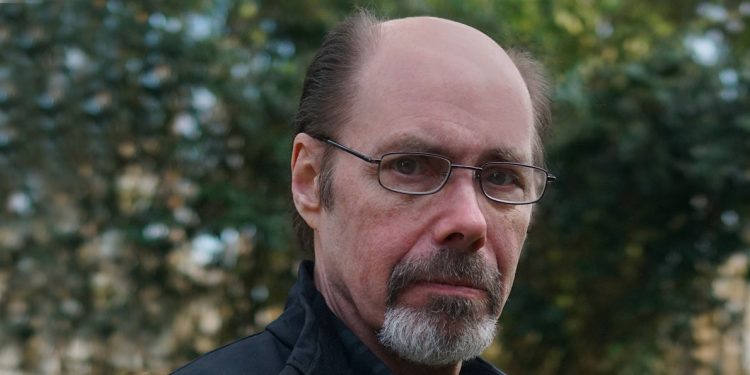Jeffery Deaver in Conversation at Theakstons Old Peculier Crime Writing Festival

By Sarah Morgan
He’s written more than 40 novels (the exact number is unknown because he refuses to discuss some early ones he describes as disastrous), sold around 150 million copies across 150 countries and been translated into 25 languages.
Oh yes, and he’s one of the funniest guys on the crime writing circuit.
Illinois-born Jeffery Deaver has made the long trip to Harrogate to talk about his extraordinary career at the Theakston’s Old Peculier Crime Writing Festival, and he’s kept what is, admittedly, a friendly crowd in the palm of his hand. His most famous creation is, of course, Lincoln Rhyme, a quadriplegic forensics expert or, as Deaver likes to describe him, “my money-maker”. Rhyme will appear for the 16th time in The Watchmaker’s Hand, which is set to be published next year.
Deaver is actually in town to promote Hunting Time, which features another of his regular characters, expert tracker Colter Shaw, who’s about to feature in his own TV series – here’s hoping it won’t be long before it reaches our shores.
Sadly, his books about special agent Kathryn Dance didn’t sell so well, but he’s optimistic about her return: “There’s a UK film company interested in them, so if that happens, I’ll sit down and write more!”

“If I plan ahead, it goes better”
But no matter who he’s writing about, Deaver always approaches his work in the same way: “The writing world is divided into two parts – the outliners and the pantsers; the pantsers are so called because they do it by the seat of their pants”.
Ann Cleeves is a pantser, because she finds it more fun that way, but Deaver says he’s an outliner because he needs to be organised.
“If I plan ahead, it goes better, and you can write it in any order you want or feel like. Outlining leads to a smoother product. It makes me feel more comfortable. But there’s nothing more subjective than writing. Telling the story is the most important thing, how you get there is up to you.”
He does, however, admit he’s tweaked his style in recent years to keep up with the shortening of our attention spans. He calls it ‘the streaming style’.
“My books, chapters, paragraphs are shorter,” he explains. “I still like my twists but I have more dialogue, less introspection, less description because I want my story to move as fast as those streaming TV series.” Where he thinks novels will always be superior to TV and films is in the way they “bring us in”. He adds: “Books are the best emotional experience we can have. We create those worlds in our minds.”
However, Jeffery Deaver admits that even he can succumb to temptations away from his computer when he should be crafting his latest work. “As writers, the one thing we want to do is avoid writing! And what is the No 1 reason not to write? The internet. Specifically videos of cute little goats in pyjamas…”
“I like the idea of crafting something my readers will like”
On a more serious note, when he is concentrating, Deaver says his readers are front and centre in his mind: “Readers are gods. Every word I write, I’m thinking about them, whether they’ll like it or not. “In Hollywood, when a producer’s looking for a project, they want something that’s been popular in the past but has never been seen before. If I pick up a John Le Carre, I don’t want it to be about aliens. I want to know what I’m getting, something about MI6. But I want something a little different too.
“So that’s what I try to do. I like the idea of crafting something my readers will like. I have sleepless nights about it, wrestling with ideas. After all this time, you’d think it would be easy, but no. But there is a moment when you know you’ve hit the right note.”
Thankfully, it seems that although Jeffery Deaver claims that knocking his tales into shape is “a chore”, he still has a wealth of plots at his fingertips. “If I was born with anything, it’s imagination,” he smiles. “I have 40 or 50 ideas for novels that may never get written, but they’re there…”
Fingers crossed we’ll be treated to at least some of them in the years to come.









